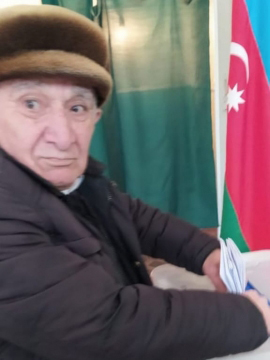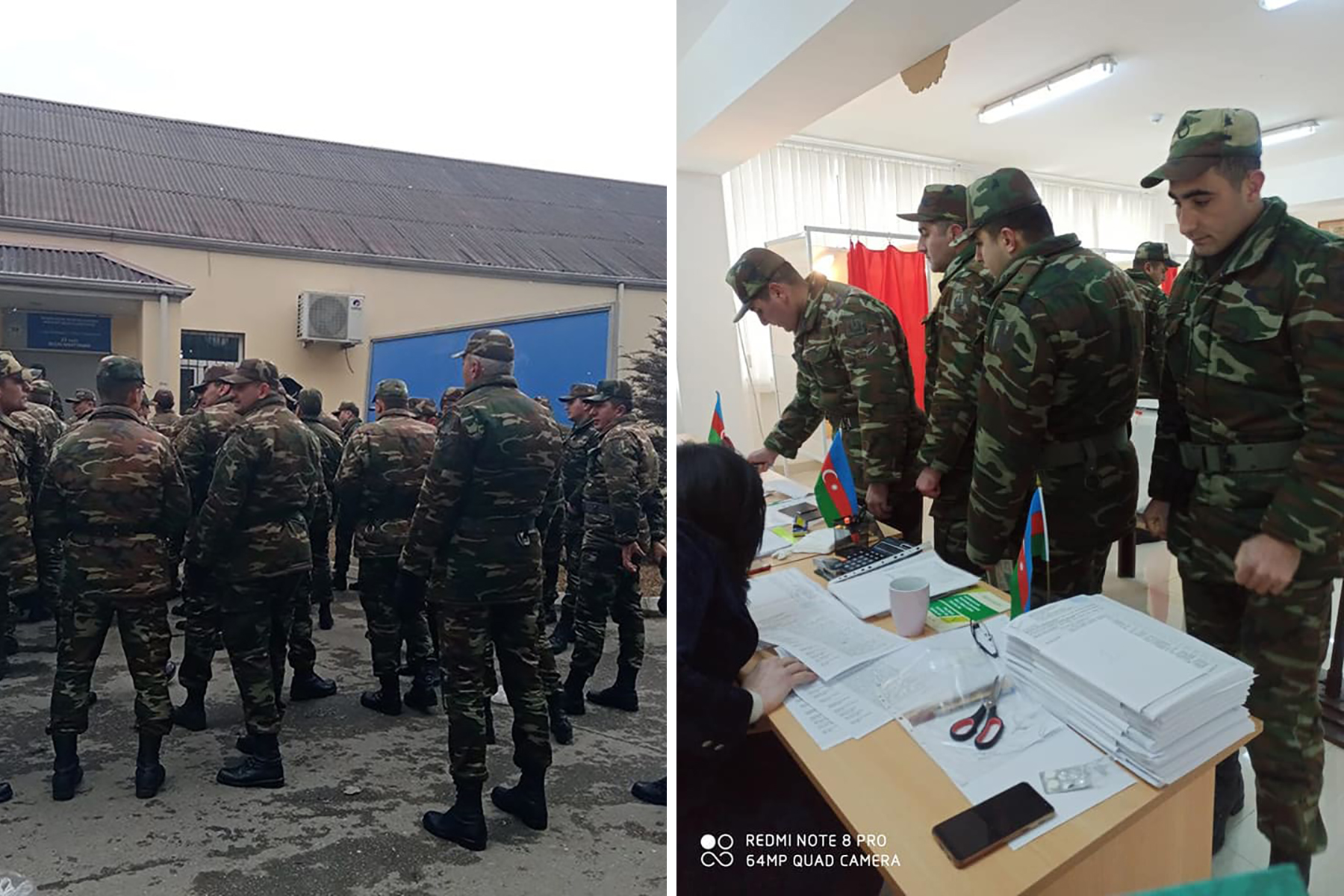Azerbaijan cancels election results for ‘at least 4 constituencies’ due to electoral fraud

Azerbaijan’s Central Election Committee (CEC) has announced it is cancelling the results of Sunday’s parliamentary election in at least four constituencies as a result of images of electoral fraud posted online.
At a meeting of the CEC on Thursday, the organisation announced that the results of two candidates from the ruling New Azerbaijan Party and two independent candidates would be annulled.
Sunday’s snap parliamentary elections, the first in the country’s post-independence history, were marked by violence against journalists and observers and widespread electoral violations.
[Read more: Preliminary results show almost no change in Azerbaijan parliament]
The announcement of the cancellations was made by CEC member Ramiz Ibrahimov, who said that an ‘investigation by an expert group showed that at all polling stations of these constituencies the rules of the law were violated’.
The CEC announced that they were investigating the results of 17 other constituencies and had sent requests to the district election commissions to investigate the results of these constituencies.
Of these, candidates from the New Azerbaijan Party led in seven, a candidate from the Motherland Party in one, and independents in the remaining nine. One is speaker of parliament Ogtay Asadov.
‘Social media is our most reliable helper’
Local news agency APA, quoted Central Election Committee Chair Mazahir Panahov as saying that social media was their ‘most reliable helper’.
He reportedly said they would investigate videos and pictures of violations at several polling stations. ‘Some people paralyse the work of the stations. They deserve to be punished’, he said.
Panahov noted that the CEC investigated ‘all the information about the constituencies on social media’.
[Read Javid Agha’s experience as an observer: Opinion | This election was our first ‘OK boomer’ to Azerbaijan’s political order]
Panahov claimed that ‘90% of violations that happened during the election day are depicted in images on social media’.
‘It is a very good tradition. And that’s why we are grateful to the bloggers who express their attitude to violations of the law at polling stations’, he said.
The CEC also accepted an application by the OSCE/ODIHR election observation mission to cancel the accreditation of observer Aygun Attar.
Panahov said that an election observer only had the right to observe the election process at the polling stations, note it, and present it to the chair of the precinct election commission.
‘An observer does not have the right to give directions to the commission. At many polling stations, observers violated the law. These violations may even be criminal in nature’, he said.
Panahov said that the protest of the candidates who were not elected is natural. ‘To protest is the right of everyone’, he said, ‘It would be surprising if an elected candidate would protest’.
On Tuesday Azerbaijani police forcefully dispersed a spontaneous protest outside the Central Election Committee in Baku against the results of Sunday’s parliamentary elections. Several people were injured during the dispersal, in which police also attacked journalists covering the protest.
[Read more on OC: Police violently disperse Azerbaijan election protest]
Panahov said that Tuesday’s protest showed that the social-political relations in Azerbaijan were ‘civilized’.
Another protest against elections’ results is planned on 16 February.
‘New elections are unlikely’
Anar Mammadli, the head of the Election Monitoring and Democracy Studies Centre (EMDS), a local election watchdog, told OC Media that CEC’s decisions were still not an adequate response to the scale of electoral fraud that occurred throughout the country.
‘The violations happened not only at five constituencies — they happened in the whole country.’
‘Both local and international observers were witnesses of the same violations’.
‘In such a situation, Azerbaijan took such steps to create a normal image of the elections and at the same time to reduce the international reactions.’
Mammadli said that the results of more constituencies should be cancelled. ‘This process should be investigated in a fair and objective way’.
He added that the cancellation a large number of constituencies was unlikely, as it could lead to new elections being called.
‘But I do not believe in this, I don’t think that it depicts the will of the ruling political team. And of course, the CEC is dependent on the government and could not make such a decision as an independent body’, he concluded.
‘Undemocratic’ elections
Preliminary results in Sunday’s elections gave the ruling New Azerbaijan Party 72 of 125 seats.
On Monday, opposition coalition the National Council of Democratic Forces stated that the elections were falsified and ‘do not reflect the will of the people’. Similar statements came from the Umid and Real Parties.
The Musavat Party called for the cancellation of the results.

In a joint statement on Monday, the observation missions from the OSCE and Parliamentary Assembly of the Council of Europe (PACE) called into question the results.
‘The restrictive legislation and political environment prevented genuine competition in Azerbaijan’s early parliamentary elections’, the statement said.
‘Although some prospective candidates were denied the right to stand, candidate registration was otherwise inclusive. Despite the large number of candidates, voters were not provided with a meaningful choice, due to a lack of real political discussion.’
The head of the PACE delegation, Frank Schwabe, said that ‘despite some appearance of progress in the preparation for the elections, the widespread violations of counting procedures raised serious concerns about the results of the voting in general’.
Artur Gerasymov, Special Coordinator for the OSCE observer mission said, ‘I regret very much that what could have been improvements did not lead to a competitive environment enabling truly democratic elections. Counting on election day was disappointing. I would have hoped for some real changes.’
The European Union also stated on Tuesday that they ‘regret that long-standing recommendations by OSCE/ODIHR and the Council of Europe’s Venice Commission still have to be addressed. The EU stands ready to assist in this process’.

Arif Hajili, the chair of the Musavat party, stated on Tuesday that Musavat and Real parties, along with the D18 organisation and independent candidates had requested permission from the Baku city administration to hold a protest on 16 February.
Ruslan Izzetli, the head of the D18 Movement, told OC Media that he was denied permission for the protest on Wednesday before being told they could hold a protest in Lokbatan, on the outskirts of Baku.









